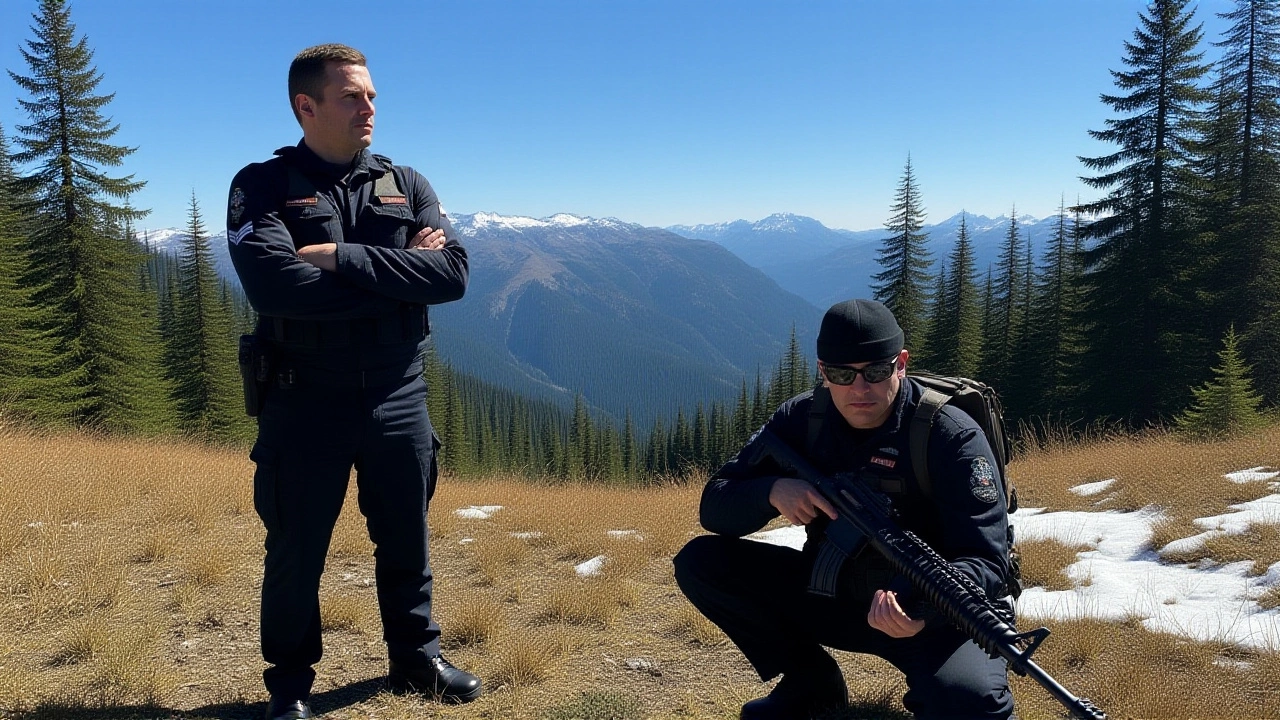During grizzly bear attackFarm Cabin Trail near Pass Lake, two unidentified hikers were mauled by a defensive female grizzly with two cubs on Sunday, October 12, 2025. The incident unfolded about 1.2 km from the trailhead in the remote reaches of the Cariboo Regional District, British Columbia. Both victims – a 34‑year‑old male from Vancouver and a 29‑year‑old female from Kelowna – were air‑lifted to University Hospital of Northern British Columbia in Prince George, where they remain in intensive care. The attack has sparked renewed conversation about backcountry safety across western Canada.
What Happened on the Trail
According to the British Columbia Conservation Officer Service (COS), the hikers inadvertently entered a dense berry patch where the mother bear and her two cubs were foraging. Surveillance footage from a nearby trail camera shows the party stopping less than 15 meters from the sow before a sudden charge forced the bear to stand on its hind legs, swiping with massive claws. Both hikers suffered multiple lacerations, fractured clavicles, and soft‑tissue injuries that required emergency surgery.
Response from Conservation Authorities
Eamon McArthur, Senior Conservation Officer and public information officer for COS’ Northern Region, led the on‑site investigation on Monday, October 13. "After a comprehensive review of the scene, including track patterns, scat samples, and the spatial relationship between the hikers' location and the bear family, our team determined this was a classic defensive encounter rather than a predatory attack," McArthur told reporters at COS headquarters in Victoria on Tuesday. He added that defensive encounters account for roughly 78% of bear‑human incidents in the province over the past decade.
In line with the B.C. Park Act Section 14(1)(b), COS ordered an immediate closure of the 3.7‑kilometre Farm Cabin Trail. Eight bilingual (English/French) warning signs bearing GPS coordinates (53.8921° N, 122.6347° W) were installed at all access points. The trail is slated to stay closed for at least 14 days while daily patrols monitor bear activity.

Medical Treatment and Hospital Care
At University Hospital of Northern British Columbia, the trauma team was headed by Dr. Anya Petrova, Director of Trauma Services. The male patient required 2 hours and 17 minutes of emergency surgical intervention to repair deep shoulder lacerations and a broken clavicle. The female patient spent 87 minutes in the operating room before being transferred to the orthopedic ward for fracture stabilization. Both patients were later moved to the intensive‑care unit, where they are now reported to be stable and responding well to treatment.
Broader Context of Bear‑Human Conflicts in B.C.
The COS Annual Wildlife Conflict Report released in January 2025 notes that 2025 has already seen 12 bear‑human incidents, surpassing the five‑year average of 9.4 per year. Defensive encounters made up 63% of those cases, underscoring the importance of distance and noise‑making in bear country. The report also highlights that most incidents occur in the Cariboo and North Coast regions, where human recreation overlaps heavily with prime bear habitat.
Indigenous partners, including the Lheidli T'enneh First Nation, whose traditional territory encompasses the Farm Cabin Trail area, have been consulted on post‑incident mitigation strategies. Their input stresses the value of cultural knowledge about bear behaviour and traditional travel routes that historically minimized conflict.

Safety Recommendations for Future Hikers
Following the attack, COS released Alert Bulletin #2025‑47 outlining mandatory safety measures for anyone venturing into bear country:
- Carry an EPA‑approved bear‑spray canister (minimum 230 g, 7.9 m effective range) at all times.
- Hike in groups of four or more; solitary hikers are at higher risk.
- Make noise—talk, sing, or clap—especially at trail junctions, near streams, and in dense vegetation.
- Maintain visual contact with the trail ahead; avoid stopping directly in front of potential food sources like berry patches.
- Equip yourself with a satellite communicator capable of transmitting GPS coordinates in emergencies.
The COS also plans to distribute updated informational pamphlets to local outfitters and to host a series of community workshops in Prince George and Williams Lake over the next month.
Frequently Asked Questions
How does this incident affect hikers planning trips in the Cariboo region?
The temporary closure of the Farm Cabin Trail means hikers must reroute to alternate pathways, many of which now feature additional signage warning of bear activity. The new safety protocols—mandatory bear‑spray, group size minimums, and regular noise making—are expected to become standard practice across all backcountry routes in the region.
What steps are being taken to monitor bear movements after the attack?
COS will conduct daily patrols of the incident site for the next 14 days, use motion‑activated cameras to track the sow and her cubs, and collaborate with the Lheidli T'enneh First Nation to incorporate traditional bear‑tracking knowledge. Any further aggressive behaviour will trigger additional closures.
Why are defensive encounters more common than predatory attacks?
Grizzly bears are highly protective of their cubs and food caches. When humans inadvertently come within 15‑20 metres of a sow and her young, the bear interprets the approach as a threat, prompting a defensive response. Predatory attacks, where a bear actively seeks a human as prey, are exceedingly rare in B.C.
What medical resources are available for wilderness injuries in northern B.C.?
University Hospital of Northern British Columbia operates a Level‑1 trauma centre equipped for complex orthopedic and soft‑tissue surgery. The hospital also maintains a rapid‑response air‑ambulance service that can transport patients from remote sites within 30 minutes under optimal weather conditions.
Will the bear involved face any management actions?
COS officials have stated the incident was purely defensive, so no lethal action will be taken against the sow or her cubs. Instead, monitoring will continue to ensure the bears do not become habituated to human presence.
